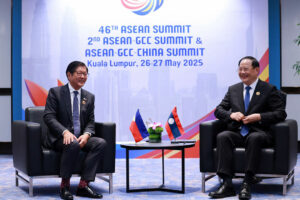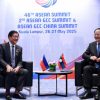The great American baseball pitcher Satchel Paige once said, “Don’t look back. Something might be gaining on you.” That’s great advice for life — but not when it comes to increasing our competitiveness in comparison to ASEAN peers.
There, the Philippines is always wise to look back, look around, and find ways to expand our international trade in goods and services, and attract foreign investment, all to drive economic growth. Sometimes, even highly technical issues can have an outsized impact in promoting — or deterring — our country’s growth. Here’s one example that can be easily solved to show the Philippines treats its foreign partners fairly.
As with most countries, the Philippines has a series of treaties with our major trading partners designed to avoid the payment of double tax. Among other provisions, the treaties typically provide that payments made by customer residents here in the Philippines for services rendered by a foreign company should not be subject to Philippine tax, specifically, a withholding tax. That is fair and a standard provision in these tax treaties.
Right now, though, the process of receiving this treaty benefit is cumbersome, burdensome, and exceptionally slow. Under Revenue Memorandum Circular (RMC) No. 77-2021, domestic taxpayers must file a Request for Confirmation (RFC) if the treaty rate has been applied, or a Tax Treaty Relief Application (TTRA) if the regular rate has been used — then apply for a refund. The documentation burden is heavy, and refund claims can take years to resolve.
The solution is simple: the BIR should follow international best practices by removing the need for prior approval to access tax treaty benefits. Countries like Thailand and Australia require no approval. Alternatively, the process could be moved online and replaced with a straightforward notification (rather than approval) system, similar to the approaches used in Singapore and Indonesia. These streamlined systems reduce barriers for investors — a model the Philippines urgently needs to adopt.
The current manual approval process in the Philippines requires numerous documents — some requiring notarization — in-person meetings, and other requirements as provided in Revenue Memorandum Order No. 14-2021 — and then doing the process all over again customer-by-customer rather than having one certificate for one foreign taxpayer for all income payments, all to obtain a benefit that the foreign company should be automatically entitled to under the tax treaty. It discourages companies from investing here when the treaty benefits can be obtained automatically elsewhere. An upside with simple notification is it highlights precisely who is claiming the benefits.
The Philippines stands out in ASEAN for imposing an excessively burdensome and documentation-heavy process to access tax treaty benefits. This not only delays legitimate claims but can also trigger additional audits, discouraging investment. While safeguards against abuse are necessary, entitled taxpayers should be able to access treaty benefits simply and efficiently.
Our tax treaty partners, including the United States and Japan, deserve straightforward access to the benefits of the treaties they have signed with the Philippines.
These onerous requirements harm both foreign investors and their Filipino partners, many of whom choose to absorb the tax rather than endure a slow, complex process or face potential audits. This uncertainty denies them rightful benefits and raises the cost of doing business in the country for everyone involved.
Indonesia is now experiencing record levels of foreign investment, with Thailand’s applications rising sharply. In the digital sector, our English-speaking competitor Malaysia is reaching new heights. The Philippines did see an increase in overall investment in 2024, but this followed a decline in 2023 — a sign there’s still room for improvement. In today’s competitive landscape, removing barriers for investors is more important than ever.
The BIR should act quickly through new regulations to simplify access to treaty benefits. Withholding tax relief should be automatic for those entitled — just as Philippine companies enjoy abroad. Streamlining this process will support local firms, attract technology investment, and strengthen the broader economy.
_______
Daniel A. Witt is the President of the International Tax and Investment Center (ITIC), a global organization promoting pro-investment tax and economic reforms in over 85 countries. With more than 30 years of experience, he has led policy dialogues across frontier markets and co-founded major regional tax forums in Asia, Africa, and the Middle East. Recognized for his work in Kazakhstan and other transitioning economies, he continues to advise governments, industry leaders, and global institutions on tax and investment policies.
Mon Abrea, CPA, MBA, MPA is the Founder and CEO of the Asian Consulting Group (ACG) and the Philippines’ foremost advocate of genuine tax reform. A Harvard graduate who also completed an executive program on Climate Policy at Oxford, he advises governments, multinational corporations, and global institutions on tax policy, governance, and sustainable investment. He has delivered investment and tax briefings in over 50 countries and states across Asia, North America, Europe, Australia, and the Middle East. He also hosts the podcast Thought Leaders and Game Changers, where he speaks with global experts on taxation, sustainability, and innovation. Follow him: @askthetaxwhiz.
Spotlight is BusinessWorld’s sponsored section that allows advertisers to amplify their brand and connect with BusinessWorld’s audience by publishing their stories on the BusinessWorld Web site. For more information, send an email to online@bworldonline.com.
Join us on Viber at https://bit.ly/3hv6bLA to get more updates and subscribe to BusinessWorld’s titles and get exclusive content through www.bworld-x.com.


















